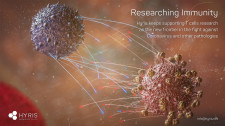A New T-Cell activation assay based on Hyris qPCR Technology marks a disruptive approach for the detection of SARS-CoV-2 specific cellular immunity
A scientific paper recently published in Nature Biotechnology reveals new research regarding how we track and monitor T-cell patients' immunity to SARS-CoV-2, leveraging the unique characteristics of Hyris System™. The study results from a joint effort of an international research team from the Icahn School of Medicine at Mount Sinai, Singapore Duke-NUS Medical School, laboratory diagnostic service providers Synlab, and Hyris.

LONDON, June 15, 2022 (Newswire.com) - With over 460 million global cases thus far, 6 million of which have resulted in death, the COVID-19 pandemic from SARS-CoV-2 proved to be a dire health crisis on a global scale. In this concerning scenario, the unprecedented effort by the international scientific community is even more remarkable and led - in record time - to the deployment of mRNA and viral vector-based vaccines. With more than 10 billion total vaccine doses administered worldwide, vaccination campaigns have already started to attenuate this global crisis. In order to maximize vaccine effectiveness, the efficacy and duration of protective immunity will need to be systematically assessed and monitored as widely as possible.
A team of internationally renowned medical scientists recently published a related paper in Nature Biotechnology, addressing the efficacy and sensitivity of a new type of assay to detect SARS-CoV-2 cellular immunity.
"To date, antibody tests have been the typical, if not the only clinical endpoints commonly used to measure the immune response to SARS-CoV-2," explains Antonio Bertoletti, Professor at Duke-NUS Medical School. "Both the humoral (antibodies) and cellular immune response act in coordination to achieve long-term protection from viral infections. Antibodies are important for preventing infection, protecting the body from disease, while cellular immunity is essential to eliminate virus-infected cells, thus helping to fight the disease itself," concludes Professor Bertoletti.
Therefore, according to the study, measuring the T-cells' response is a new disruptive approach to fighting SARS-CoV-2. An individual negative to an antibody test could still be protected thanks to responsive T-cells.
This new study thus shows the relevance of a quantitative PCR approach to T-cell testing, thanks to the joint effort with SYNLAB, one of the world's leading providers of laboratory diagnostic services, and Hyris, a global biotech company focused on AI-powered genetic analysis.
The research leveraged Hyris' signature technology, the disruptive Hyris System™.
"These highly scalable screening methods will be particularly important, to monitor the magnitude and duration of functional cellular immunity towards emerging variants, thus helping to prioritize revaccination strategies in vulnerable populations," states Cristina Lapucci, Head of Genetics and Molecular Biology at SYNLAB Italy.
"We have been very committed to putting our System at such prestigious partners' service," says Stefano Lo Priore, Founder and CEO at Hyris. "Many medical institutions worldwide already adopted our technology, embracing the unprecedented simplicity, connectivity, and scalability of the Hyris SystemTM."
The rapid deployment of SARS-CoV-2 vaccines to a large proportion of the population now suggests new approaches to measure the duration of the immune response, and the potential need for vaccine boosters should be evaluated.
"The assays used in our study rely on the quantification of CXCL10 mRNA after incubation of whole blood with SARS-CoV-2 specific peptides. The levels of induced CXCL10 transcripts correlate robustly with the IFN-gamma produced by activated antigen-specific T cells, serving as a proxy to detect cellular immunity in COVID-19 recovered and SARS-CoV-2 vaccinated subjects," points out Ernesto Guccione, PhD, Professor of Oncological Sciences, and Pharmacological Sciences, at Icahn Mount Sinai.
"This is particularly important after the emergence of SARS-CoV-2 variants like Omicron that evade most of the neutralizing ability of antibodies, but not that of T-cells," continues Megan Schwarz, a graduate student at Icahn School Mount Sinai and first author of the manuscript. "Precise measurement of cellular responses underlying virus protection, therefore, represents a crucial parameter of immune defence."
"The solutions already present on the market are usually performed based on the traditional fluorescence methodologies typically used in the immunological domain," adds Jordi Ochando, PhD, Assistant Professor of Oncological Sciences, Medicine (Nephrology), and Pathology, Molecular, and Cell-Based Medicine at Icahn Mount Sinai. "This research demonstrates that CXCL10 mRNA expression confirms data obtained with traditional methods (i.e., ELISpot) compared with naïve, COVID-19 convalescent and SARS-CoV-2 vaccinated subject," he concludes.
This study could prove a key solution to further support the scientific community playing a strategic role in facing this global challenge.
Contact a Hyris expert to discover how to perform beyond your current diagnostic capability at info@hyris.net.
Source: Hyris
Share:
Categories: Sciences, Pharmaceuticals and Biotech, Healthcare and Medical News, Laboratory Services, Genetics
Tags: antibodies, biotech, Coronavirus, COVID-19, covid19vaccines, Duke-NUS, geneticanalysis, guccionelab, healthcare, Hyris, immune, immunology, medicalcare, MountSinai, qPCR, synlab, T-cell
Related Files
Global Media Relations





